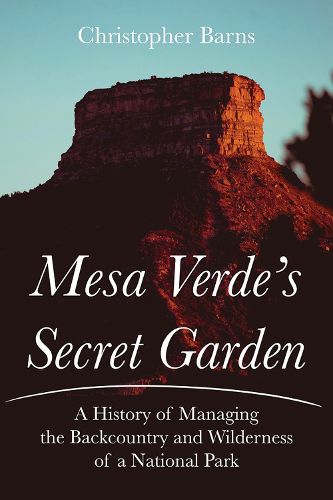Readings Newsletter
Become a Readings Member to make your shopping experience even easier.
Sign in or sign up for free!
You’re not far away from qualifying for FREE standard shipping within Australia
You’ve qualified for FREE standard shipping within Australia
The cart is loading…






Mesa Verde National Park is the only congressionally designated land-based Wilderness to prohibit all recreational use. While backcountry use was encouraged for decades, stewardship changed over time as "gardening" the park for aesthetic purposes decreased while secrecy increased. The reasons for these changes, as Christopher Barns discovered, are multifaceted, but ultimately they reflect a desire to protect the park's thousands of archaeological sites, including six hundred Ancestral Puebloan cliff dwellings, while allowing natural processes to continue. However, most of the park is without recognizable cultural features, and if the public is prohibited from experiencing the surrounding landscape, Barns asks, what is being protected and for whom?
Mesa Verde's Secret Garden is an authoritative history of Mesa Verde National Park's management. The book utilizes unpublished primary sources from the park's archives-including internal memos, public reports, interviews, and anonymous marginalia-and contextualizes them in the evolving (and often conflicting) federal and local priorities for Wilderness, conservation, and the national parks. The result of this painstaking research is a fascinating chronicle of national-park administration and development over a nearly 120-year history that provides unique insights into the people and protocols that have shaped the very landscape of Mesa Verde.
$9.00 standard shipping within Australia
FREE standard shipping within Australia for orders over $100.00
Express & International shipping calculated at checkout
Mesa Verde National Park is the only congressionally designated land-based Wilderness to prohibit all recreational use. While backcountry use was encouraged for decades, stewardship changed over time as "gardening" the park for aesthetic purposes decreased while secrecy increased. The reasons for these changes, as Christopher Barns discovered, are multifaceted, but ultimately they reflect a desire to protect the park's thousands of archaeological sites, including six hundred Ancestral Puebloan cliff dwellings, while allowing natural processes to continue. However, most of the park is without recognizable cultural features, and if the public is prohibited from experiencing the surrounding landscape, Barns asks, what is being protected and for whom?
Mesa Verde's Secret Garden is an authoritative history of Mesa Verde National Park's management. The book utilizes unpublished primary sources from the park's archives-including internal memos, public reports, interviews, and anonymous marginalia-and contextualizes them in the evolving (and often conflicting) federal and local priorities for Wilderness, conservation, and the national parks. The result of this painstaking research is a fascinating chronicle of national-park administration and development over a nearly 120-year history that provides unique insights into the people and protocols that have shaped the very landscape of Mesa Verde.